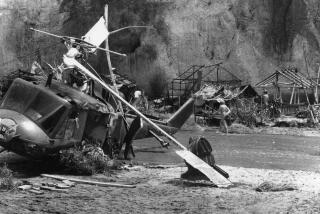Award in Plane Crash Overturned : Courts: Judge voids $57-million verdict, saying plaintiffs’ lawyer should have disclosed that he once worked for firm that represented aircraft maker.
- Share via
Jubilation has once again turned into frustration for the heirs of three men killed more than 17 years ago in the crash of a light plane at Rialto Airport in San Bernardino County.
In July, after a protracted legal battle, they won a $57-million jury verdict against the plane’s manufacturer, Beech Aircraft Corp., and its insurer.
But a San Mateo Superior Court judge has overturned the verdict, saying that the families’ lawyer “breached his ethical obligation” by not disclosing to the court that he formerly was associated with the firm that represented the defendant in a related case.
“I’m disappointed, but I’m not surprised,” said Sandra Dunaway of Northridge, one of the women widowed by the crash. “We’ve been going through this for . . . years.”
The jury found that the company acted in bad faith when it refused to settle the initial lawsuit filed by the victims’ families despite reasonably clear evidence of negligence in the manufacture of the twin-engine Model 95 Travelair.
Instead of settling, Beech fought the families for 11 years, taking the case to the Supreme Court. In 1985, Dunaway and the other widows, Doris Santesson of Santa Clarita and Mildred Best of Redlands, and their children were finally able to collect a $1.8-million judgment against Beech, which they split with the family of pilot Edward Miro, who also died in the 1974 crash.
The bad-faith suit, which led to the July verdict, was filed the following year.
Although their attorney, John C. Taylor, did not work on the Beech matter during his association with the law firm of Morris, Polich & Purdy from 1979 to 1984, there was no evidence that he was “screened from obtaining evidence or information” about the case, Judge Aram Serverian ruled.
Taylor argued unsuccessfully that he never tried to hide his previous employment and was not involved in the earlier litigation. He said Beech knew his background but held on to the information as a “trump card” to be played after the verdict was handed down.
In his Aug. 22 ruling, the judge also ordered a new trial on the grounds that the punitive damages assessed against Beech were excessive because they amounted to more than one-quarter of the company’s net worth.
In what may be the largest such judgment ever won by individuals in California, the jury awarded punitive damages of $15 million to each widow and the estate of Mildred Best, who died in January, and $4 million to each of the three children. They also won a total of $553,000 in compensatory damages.
“The jury obviously evaluated each plaintiff individually,” said Taylor, who has appealed the judge’s order--a process that could consume another three years.
Beech officials declined to discuss the ruling. “We don’t feel it’s appropriate to comment at this time,” spokesman Mike Potts said from the company’s Wichita, Kan., headquarters.
Santesson was traveling and could not be reached. But Dunaway said she is shelving plans to return to her hometown of Bogalusa, La., and will try to find work.
“There is some anger, but what good is it going to do me?” she asked.
More to Read
Sign up for Essential California
The most important California stories and recommendations in your inbox every morning.
You may occasionally receive promotional content from the Los Angeles Times.













